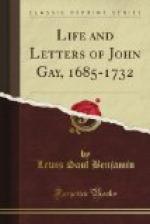Immortal Rich! how calm he sits at ease,
’Midst snows of paper, and fierie
tale of pease;
And proud his Mistress’s orders
to perform,
Rides in the whirlwind, and directs the
storm;
and the opera, to repeat a well-known mot of the day, “made Gay rich and Rich gay.”
“The Beggar’s Opera” was produced on January 29th, 1728, with the following cast:—
Peachum ... ... ... ... ... MR. HIPPISLEY Lockit ... ... ... ... ... MR. HALL Macheath ... ... ... ... ... MR. WALKER Filch ... ... ... ... ... MR. CLARK Jemmy Twitcher... ... ... ... MR. H. BULLOCK Mrs. Peachum ... ... ... ... MRS. MARTIN Polly Peachum ... ... ... ... Miss FENTON Lucy Lockit ... ... ... ... MRS. EGLETON Diana Trapes ... ... ... ... MRS. MARTIN
At the first performance the fate of the opera hung for some time in the balance. Quin is recorded as having said that there was a disposition to damn it, and that it was saved by the song, “O ponder well! be not severe!” the audience being much affected by the innocent looks of Polly, when she came to those two lines which exhibit at once a painful and ridiculous image—
O ponder well! be not severe!
For on the Rope that hangs my Dear
Depends poor Polly’s Life.[6]
Pope, too, and the rest of Gay’s friends were present. “We were all at the first night of it, in great uncertainty of the event; till we were very much encouraged by hearing the Duke of Argyll, who sat in the next box to us, say: “It will do—it must do!—I see it in the eyes of them,” he said. “This was a good while before the first act was over, and so gave us ease soon; for the Duke (besides his own good taste) has a more particular knack than any one now living, in discovering the taste of the public. He was quite right in this, as usual, the good nature of the audience appeared stronger and stronger every set, and ended in a clamour of applause."[7]
The success of the opera was due to many causes. Some liked it for its barely veiled allusions on politicians. “Robin of Bagshot, alias Gorgon, alias Bluff Bob, alias Carbuncle, alias Bob Booty,” was very obviously intended for Walpole and his “dear charmers” for his wife and Molly Skerrett. It may well be believed that the song, “How happy could I be with either” brought down the house; and the highwayman must have evoked a hearty laugh with—
And the statesman, because he’s
so great,
Thinks his trade as honest as mine.




